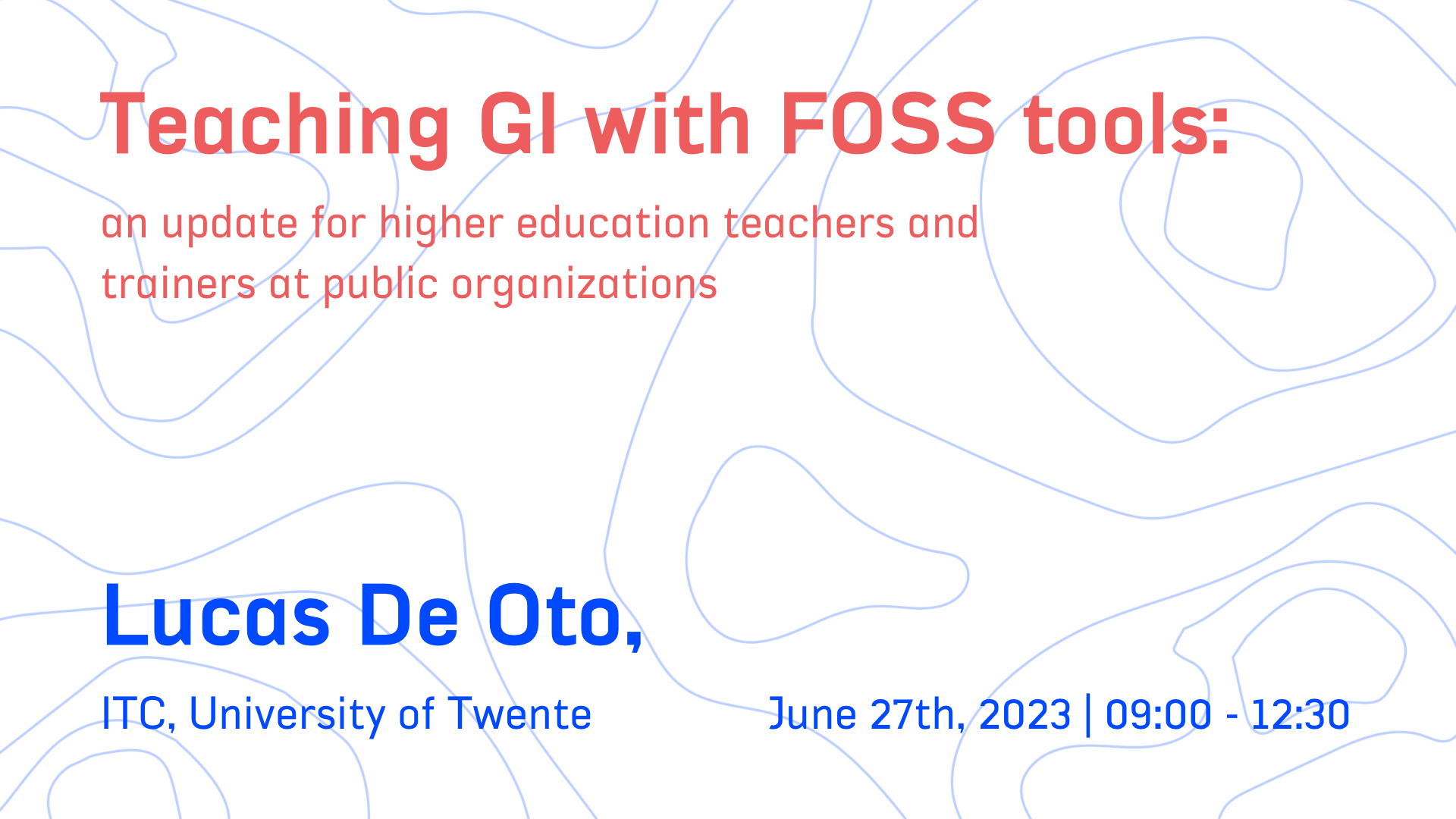 Side event led by Lucas De Oto, ITC, University of Twente
Side event led by Lucas De Oto, ITC, University of Twente
FOSS4G 2023, Prizren, 26-30 June, 2023
In recent years, the combination of technological advances and spatial data abundance revolutionised the field of geoinformation (GI). New methodologies and techniques established in other fields of knowledge proved to be relevant to keep up to date and fully benefiting from all this technological richness. Consequently, new areas of knowledge have emerged, such as geospatial artificial intelligence (GeoAI) or big geodata. Simultaneously, the formulation in 2015 of the 2030 Agenda for Sustainable Development and its multiple goals by the United Nations (UN), impose a specific framework for the application and further development of geoinformation science. Furthermore, the recent COVID-19 pandemic accelerated the transition towards different modalities of distance education as well as the arrival of multiple digital instruments to fulfil this purpose. At the same time, the use of free and open-source software (FOSS) keeps gaining momentum, standing out as the best technological solution to attain sustainable and democratic approaches to geospatial problems.
All these factors have profoundly impacted the way of teaching with GI and about GI. Both technical and socio-emotional skills required to successfully perform as a GI scientist in the near future are changing. And so are the means to learn those skills. As a result, the training curriculum for educators in this field is being revised and updated. In this presentation, we will first discuss the challenges currently faced by educators in the field of GI and explore new didactic and pedagogical proposals to overcome them. We will analyse how teaching GI science in academic settings (i.e., high school, university) differs from teaching it to staff members at public organisations. We will then explore how to successfully implement the ADDIE (i.e., Analyse-Design-Develop-Implement-Evaluate) model of instructional design in both settings. Finally, we will explore together in detail a recently designed refresher course on geodata analysis and dissemination that combines state-of-the-art pedagogical approaches and the use of FOSS4G.
Schedule
Date: June 30th, 2023
09:00 – 10:15 Welcome and introduction
Presentation I: Teaching GI with FOSS today: challenges and opportunities
10:15 – 10:30 Break
10:30 – 11:30 Presentation II: Differences between academic and organisational training. How to properly design education for different educational settings?
11:30 – 11:40 Break
11:40 – 12:00 Case study: Online refresher course “Geo-web application building with FOSS”
12:00 – 12:30 Plenary discussion
Closing
Register here for participating in the event.
Lucas De Oto
Lucas De Oto graduated as a geographer and lecturer in geography from the University of El Salvador in Buenos Aires, Argentina. He received his MSc degree in Geo-Information for Natural Resources Management at ITC, University of Twente, The Netherlands. In Argentina, he worked both as a consultant geographer and GIS specialist for various ministries and other governmental agencies, notably the National Institute of Geography and the National Institute of Statistics and Censuses. He also collaborated as an adjunct researcher with the National Scientific and Technical Research Council (CONICET) and the Pedagogical University of Buenos Aires (UNIPE). In 2017 he joined the University of Twente where he teaches and coordinates different modules of the master’s program and other courses at the Faculty of Geo-information Science and Earth Observation (ITC). He also collaborates in the development of didactic material, organisation, and delivery of international training as part of capacity development efforts of the faculty. His current research focuses on the use of machine learning for geographical regionalization purposes.
